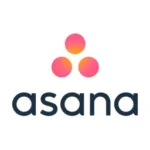
Asana
Freemium
Comprehensive work management platform for streamlined team collaboration and productivity.

Key Information
Key Information
Features
- Smart project management with AI-generated templates
- Portfolio management with summary reports
- Capacity planning for resource allocation
- Custom workflows with automated actions
- Advanced reporting with customizable dashboards
- Cross-platform integration with popular tools
- Enterprise-grade security features
- Mobile apps for Android and iOS
- Team collaboration tools with file sharing
- Multiple view options including lists, boards, and timelines
Pros
- Multiple project visualization options through lists, boards, and Gantt charts
- Team collaboration support for up to 500 members
- Up to 25,000 monthly automations
- AI assistance for project templates and goal writing
- Comprehensive portfolio tracking capabilities
Cons
- Initial learning curve for complex features
- Limited advanced features on mobile apps
- Restricted template customization options
- 100MB file size limit per upload
Pricing
- Personal: Free forever for up to 10 team members
- Starter: $6.92/month (annual) or $8.50/month (monthly)
- Advanced: $15.74/month (annual) or $19.21/month (monthly)
- Enterprise and Enterprise+: Custom pricing
—
What is Asana?
Asana stands as a leading work management platform that helps teams organize, track, and manage their work in one place. The platform combines project management capabilities with AI-powered features to streamline workflows and boost productivity.
Teams can use Asana to set clear goals, create detailed project plans, assign tasks, track progress, and collaborate effectively. The software adapts to various work styles by offering multiple views like lists, boards, timelines, and calendars. With its Work Graph® technology, Asana connects all work elements – tasks, projects, conversations, and files – creating a comprehensive picture of how work fits together across an organization.
Key Features
- Smart Project Management lets teams kick off projects faster with AI-generated project templates and automated workflows. The platform creates customized project structures based on best practices and past successful patterns.
- AI-Powered Goals helps write more effective objectives using artificial intelligence. Teams can set weighted goals and track progress with automatic rollups for precise, real-time measurement of goal achievement.
- Portfolio Management provides big-picture visibility with summary reports and PDF exports. Leaders can quickly share updates and track multiple projects from a high level, with options to archive inactive portfolios while maintaining historical records.
- Capacity Planning Tools allow managers to visualize project staffing needs and balance workloads. Teams can track resource allocation, duplicate assignments, and manage team member availability across projects.
- Custom Workflows and Automation reduces manual work through rules and triggers. Teams can set up automated actions based on task status changes, approvals, or milestone completions.
- Advanced Reporting and Analytics delivers real-time insights through customizable dashboards and charts. Users can now copy and paste dashboard charts directly into external presentations.
- Cross-Platform Integration connects seamlessly with popular tools like Microsoft Calendar, Slack, Google Workspace, and hundreds of other applications through its extensive API.
- Enterprise Security Features include HIPAA compliance options, proactive AI controls, and team content permissions. Administrators can manage security settings through a centralized console.
- Mobile Optimization brings key features to Android and iOS devices. Recent updates added a “needs attention” widget and home screen customization for Android users.
- Collaborative Tools enable team communication through project-specific conversations and task comments. The platform supports file sharing and task dependencies for coordinated teamwork.
- Smart Summaries generates AI-powered project updates that can be shared as status reports or converted into team messages. This feature helps keep stakeholders informed with minimal manual effort.
- Customizable Views presents work in various formats including lists, boards, timelines, and calendars. Teams can switch between views based on their preferred way of visualizing work.
Main Advantages
- Flexible Project Views offer multiple ways to visualize work through lists, boards, calendars, and Gantt charts, making it easy for different team members to work in their preferred style.
- Seamless Team Collaboration supports up to 500 team members in paid plans, with real-time updates and communication tools built directly into the workflow.
- Powerful Automation Capabilities reduce manual work with up to 25,000 automations per month in advanced plans, streamlining repetitive tasks and workflows.
- Advanced AI Integration helps generate project templates, write goals, and create smart summaries, making project planning and reporting more efficient.
- Comprehensive Portfolio Management enables organizations to track and manage multiple projects simultaneously while maintaining clear visibility of progress and resources.
- Extensive Integration Options connect with popular tools and services, including advanced integrations with Salesforce, Tableau, and Power BI for enterprise users.
Key Limitations
- Learning Curve requires time for teams to master all features and capabilities, especially for complex workflow setups.
- Mobile App Restrictions limit some advanced features to desktop-only access.
- Template Customization can be challenging for specific industry needs that don’t match pre-built templates.
- File Size Limits restrict individual uploads to 100MB per file in the basic plan.
How much does Asana cost?
Personal: $0 (Free forever)
- For individuals and small teams
- Includes unlimited tasks, projects, messages, and file storage (100MB per file)
- Supports up to 10 team members
Starter: $6.92/month (billed annually) or $8.50/month (billed monthly)
- Includes timeline view, Gantt view, and project dashboards
- Up to 500 team members
- 250 automations per month
Advanced: $15.74/month (billed annually) or $19.21/month (billed monthly)
- Includes goals, portfolios, and custom fields
- Up to 25,000 automations per month
- Advanced workflow features
Enterprise and Enterprise+: Contact sales for pricing
- Unlimited features and customization
- Advanced security and compliance features
- No user seat limits
Frequently Asked Questions
1. What are the differences between Asana and other project management tools like Trello or Monday.com?
Asana offers more sophisticated project management features compared to Trello’s simpler kanban-focused approach. While Monday.com excels in customizable workflows, Asana provides stronger task management and team collaboration capabilities. The main distinction lies in Asana’s Work Graph technology, which shows how work connects across teams and projects.
2. Who is using Asana?
- Software development teams tracking sprints and product launches
- Marketing departments coordinating campaigns and content calendars
- Sales teams managing leads and customer relationships
- HR departments organizing recruitment and onboarding processes
- Educational institutions coordinating administrative tasks
- Non-profit organizations managing volunteers and events
- Creative agencies handling multiple client projects
- Remote teams needing centralized collaboration
- Construction companies tracking project timelines
- Healthcare organizations managing patient care workflows
3. What are the data backup and recovery options?
Asana automatically backs up data in real-time across multiple secure locations. Users can export project data in CSV format. Deleted items remain in the trash for 30 days before permanent deletion, allowing recovery during this period.
4. Does Asana work offline?
Asana offers limited offline functionality through its mobile apps. Users can view previously loaded tasks and create new ones, which sync automatically when internet connection resumes. However, real-time collaboration features require an active internet connection.
5. What languages does Asana support?
Asana’s interface is available in English, French, German, Spanish, Portuguese, Japanese, Chinese, Dutch, Polish, Russian, Swedish, Italian, and Korean. The platform automatically detects browser language settings but can be manually changed in preferences.
6. What are the file handling capabilities?
Asana supports file attachments up to 100MB per file in basic plans. Users can attach files directly from Google Drive, Dropbox, OneDrive, and Box. Files can be previewed within Asana for common formats including PDFs, images, and documents.
7. How does Asana handle time tracking?
While Asana doesn’t include native time tracking, it integrates with specialized time tracking tools like Harvest, Everhour, and Clockify. These integrations allow users to track time directly from Asana tasks and generate detailed time reports.
8. What kind of reporting and analytics does Asana provide?
Asana offers various reporting tools including project status updates, workload reports, and portfolio insights. Users can create custom dashboards to track key metrics, view real-time progress charts, and export data for further analysis.
Promote Asana
Free Trial
Advanced transcription service with local processing and multilingual support.
Free Trial
Comprehensive transcription and analysis platform for audio, video, and text.
Freemium
Complete educational toolkit for streamlined academic writing and research.
Freemium
Comprehensive academic companion for research-based document creation and editing.
Free Trial
Complete social media management platform for content creation and scheduling.
Freemium
Document assistant enabling interactive chat with files and videos.


